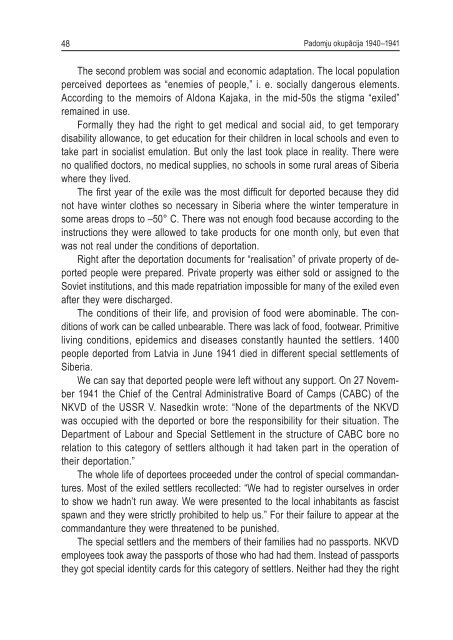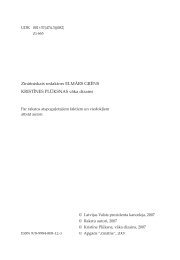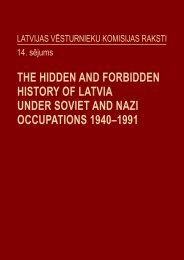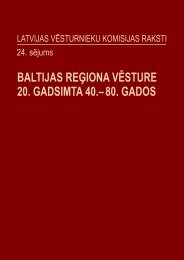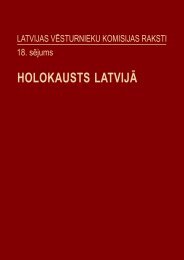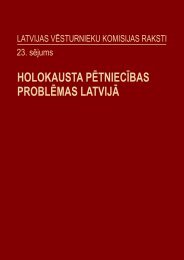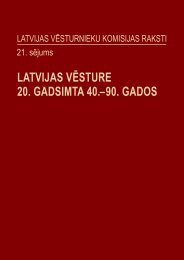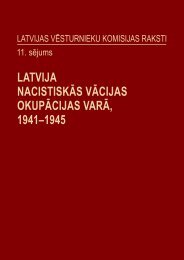15.sējums - Valsts prezidenta kanceleja
15.sējums - Valsts prezidenta kanceleja
15.sējums - Valsts prezidenta kanceleja
Create successful ePaper yourself
Turn your PDF publications into a flip-book with our unique Google optimized e-Paper software.
48 Padomju okupācija 1940–1941<br />
The second problem was social and economic adaptation. The local population<br />
perceived deportees as “enemies of people,” i. e. socially dangerous elements.<br />
According to the memoirs of Aldona Kajaka, in the mid-50s the stigma “exiled”<br />
remained in use.<br />
Formally they had the right to get medical and social aid, to get temporary<br />
disability allowance, to get education for their children in local schools and even to<br />
take part in socialist emulation. But only the last took place in reality. There were<br />
no qualified doctors, no medical supplies, no schools in some rural areas of Siberia<br />
where they lived.<br />
The first year of the exile was the most difficult for deported because they did<br />
not have winter clothes so necessary in Siberia where the winter temperature in<br />
some areas drops to –50° C. There was not enough food because according to the<br />
instructions they were allowed to take products for one month only, but even that<br />
was not real under the conditions of deportation.<br />
Right after the deportation documents for “realisation” of private property of deported<br />
people were prepared. Private property was either sold or assigned to the<br />
Soviet institutions, and this made repatriation impossible for many of the exiled even<br />
after they were discharged.<br />
The conditions of their life, and provision of food were abominable. The conditions<br />
of work can be called unbearable. There was lack of food, footwear. Primitive<br />
living conditions, epidemics and diseases constantly haunted the settlers. 1400<br />
people deported from Latvia in June 1941 died in different special settlements of<br />
Siberia.<br />
We can say that deported people were left without any support. On 27 November<br />
1941 the Chief of the Central Administrative Board of Camps (CABC) of the<br />
NKVD of the USSR V. Nasedkin wrote: “None of the departments of the NKVD<br />
was occupied with the deported or bore the responsibility for their situation. The<br />
Department of Labour and Special Settlement in the structure of CABC bore no<br />
relation to this category of settlers although it had taken part in the operation of<br />
their deportation.”<br />
The whole life of deportees proceeded under the control of special commandantures.<br />
Most of the exiled settlers recollected: “We had to register ourselves in order<br />
to show we hadn’t run away. We were presented to the local inhabitants as fascist<br />
spawn and they were strictly prohibited to help us.” For their failure to appear at the<br />
commandanture they were threatened to be punished.<br />
The special settlers and the members of their families had no passports. NKVD<br />
employees took away the passports of those who had had them. Instead of passports<br />
they got special identity cards for this category of settlers. Neither had they the right


